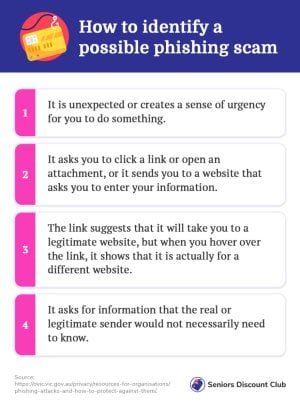Scam alert: Pensioner falls victim to simple, innocent text from her ‘daughter’
- Replies 32
Picture this: You're scrolling through your phone, and suddenly, you receive a message from your daughter. Your heart skips a beat as you read the urgent message, begging for financial help.
Without a second thought, you rush to transfer the money, only to find out later that it was all a heartless scam. Unfortunately, this scenario is becoming all too common with the rise of 'Hi Mum' (phishing) scams.
These fraudulent schemes are designed to exploit the most vulnerable part of our lives - our families. You would never expect your own flesh and blood to deceive you, which is what makes these scams so devastating.
You might recall the recent story we shared about a mother from Victoria, who fell victim to these fraudsters and lost an astounding $11,000. Can you imagine the devastation she felt when she realised that the message she had received on WhatsApp, supposedly from her daughter, was a hoax?
The scammer posed as her daughter, using a new phone number and convinced her mother to transfer money, all under the guise of a desperate plea for help.
Now, we're sad to report that another victim has fallen prey to this same tactic.

Imagine receiving a text message from your child, only to find out that it's actually a cunning scammer preying on your vulnerability. This nightmare became a reality for Donna Jaeger, a 66-year-old pensioner from Newcastle who lost her entire life savings to a heartless criminal.
The text message seemed innocuous enough at first. Donna's daughter claimed that she had dropped her phone in the toilet and needed to use a different number.
The message then took a sinister turn when her 'daughter' requested that Donna pay a bill for her, as she was unable to access her banking.
‘Why do you need to pay someone that much money?’ Donna asked the texter, to which they replied: ‘I’ll call you and explain it all later on.’
‘Now you have me worried,’ she said, and the person assured her, saying: ‘No need to be worried.’
Trusting her daughter and wanting to be helpful, Donna transferred the requested funds.
As their text exchange continued, the scammer gradually increased their demands, eventually asking for a payment of $1,900, followed by an additional $6,300. Despite feeling a bit uneasy, Donna trusted her 'daughter' and made an initial payment of $960, due to bank limits.
It was only after her savings account had been completely drained that the truth was revealed – she had been scammed. The person texting her was not her daughter, but rather a cruel scammer who saw an opportunity to deceive an unsuspecting victim.

The devastating consequences of this scam became painfully clear to Donna the next day when she spoke to her real daughter. She realised that she had been deceived by a heartless criminal who had taken advantage of her trust and willingness to help her family.
Can you imagine the sheer devastation that Donna must have felt upon discovering the truth? Her hard-earned savings, accumulated over a lifetime, were now gone, lost to a heartless criminal who had deceived her under the guise of a loved one.
According to Scamwatch, more than 1,200 reports of these scams were received between January and February of this year alone, costing Australians over $600,000. It's a staggering figure that highlights the devastating impact that these scams can have on individuals and their families.
Professor Vijay Varadharajan, a Cyber Strategist at the University of Newcastle, has noted that incidents like this have become more prevalent over the last 18 months.
He points out that scammers are becoming more sophisticated, using personal information to create a context that makes their messages seem more genuine.
'The interesting thing about these scams nowadays is the context, somehow, they know your context,' says the expert.
It's important to remember that scams can happen to anyone, regardless of age or background. That's why it's crucial to stay informed and educate ourselves and our loved ones about these types of scams.
One key tip to avoid falling victim to 'Hi Mum' scams or other similar frauds is to always verify the identity of the person making the request. If you receive a message asking for money, call the person directly or check with other family members to confirm the request is genuine.
Another important step is to never give out personal information or banking details to someone you don't know or trust. Scammers will often use this information to steal your identity or access your accounts.
By being cautious and staying informed, we can all play a role in preventing these heartless criminals from succeeding.

Remember, if you ever suspect you've fallen victim to a scam, don't hesitate to contact your bank or report the incident to the authorities. Together, we can help put a stop to these malicious schemes and protect ourselves and our communities.
And for the latest information on scams and frauds, make sure to check out the Scam Watch forum on the SDC website. Stay safe and stay vigilant, everyone!
Without a second thought, you rush to transfer the money, only to find out later that it was all a heartless scam. Unfortunately, this scenario is becoming all too common with the rise of 'Hi Mum' (phishing) scams.
These fraudulent schemes are designed to exploit the most vulnerable part of our lives - our families. You would never expect your own flesh and blood to deceive you, which is what makes these scams so devastating.
You might recall the recent story we shared about a mother from Victoria, who fell victim to these fraudsters and lost an astounding $11,000. Can you imagine the devastation she felt when she realised that the message she had received on WhatsApp, supposedly from her daughter, was a hoax?
The scammer posed as her daughter, using a new phone number and convinced her mother to transfer money, all under the guise of a desperate plea for help.
Now, we're sad to report that another victim has fallen prey to this same tactic.

What seemed like a harmless request, turned out to be a callous text scam that cost a pensioner her entire life savings. Credit: Unsplash/Adem AY.
Imagine receiving a text message from your child, only to find out that it's actually a cunning scammer preying on your vulnerability. This nightmare became a reality for Donna Jaeger, a 66-year-old pensioner from Newcastle who lost her entire life savings to a heartless criminal.
The text message seemed innocuous enough at first. Donna's daughter claimed that she had dropped her phone in the toilet and needed to use a different number.
The message then took a sinister turn when her 'daughter' requested that Donna pay a bill for her, as she was unable to access her banking.
‘Why do you need to pay someone that much money?’ Donna asked the texter, to which they replied: ‘I’ll call you and explain it all later on.’
‘Now you have me worried,’ she said, and the person assured her, saying: ‘No need to be worried.’
Trusting her daughter and wanting to be helpful, Donna transferred the requested funds.
As their text exchange continued, the scammer gradually increased their demands, eventually asking for a payment of $1,900, followed by an additional $6,300. Despite feeling a bit uneasy, Donna trusted her 'daughter' and made an initial payment of $960, due to bank limits.
It was only after her savings account had been completely drained that the truth was revealed – she had been scammed. The person texting her was not her daughter, but rather a cruel scammer who saw an opportunity to deceive an unsuspecting victim.

'Hi Mum' scams have become an increasingly common tactic used by scammers to deceive unsuspecting victims. Credit: Unsplash/freestocks.
The devastating consequences of this scam became painfully clear to Donna the next day when she spoke to her real daughter. She realised that she had been deceived by a heartless criminal who had taken advantage of her trust and willingness to help her family.
Can you imagine the sheer devastation that Donna must have felt upon discovering the truth? Her hard-earned savings, accumulated over a lifetime, were now gone, lost to a heartless criminal who had deceived her under the guise of a loved one.
According to Scamwatch, more than 1,200 reports of these scams were received between January and February of this year alone, costing Australians over $600,000. It's a staggering figure that highlights the devastating impact that these scams can have on individuals and their families.
Professor Vijay Varadharajan, a Cyber Strategist at the University of Newcastle, has noted that incidents like this have become more prevalent over the last 18 months.
He points out that scammers are becoming more sophisticated, using personal information to create a context that makes their messages seem more genuine.
'The interesting thing about these scams nowadays is the context, somehow, they know your context,' says the expert.
It's important to remember that scams can happen to anyone, regardless of age or background. That's why it's crucial to stay informed and educate ourselves and our loved ones about these types of scams.
One key tip to avoid falling victim to 'Hi Mum' scams or other similar frauds is to always verify the identity of the person making the request. If you receive a message asking for money, call the person directly or check with other family members to confirm the request is genuine.
Another important step is to never give out personal information or banking details to someone you don't know or trust. Scammers will often use this information to steal your identity or access your accounts.
By being cautious and staying informed, we can all play a role in preventing these heartless criminals from succeeding.
Key Takeaways
- A pensioner from Newcastle lost her entire savings after receiving a text from an unknown number claiming to be her daughter.
- The scammer asked Donna Jaeger to make a payment on her behalf, as her daughter supposedly couldn't access her bank account.
- Scamwatch has received more than 1,200 reports of similar scams during January and February this year, costing Australians over $600,000.
- The Australian Competition and Consumer Commission are urging people to contact known numbers and report suspicious incidents to protect themselves.
Remember, if you ever suspect you've fallen victim to a scam, don't hesitate to contact your bank or report the incident to the authorities. Together, we can help put a stop to these malicious schemes and protect ourselves and our communities.
And for the latest information on scams and frauds, make sure to check out the Scam Watch forum on the SDC website. Stay safe and stay vigilant, everyone!








